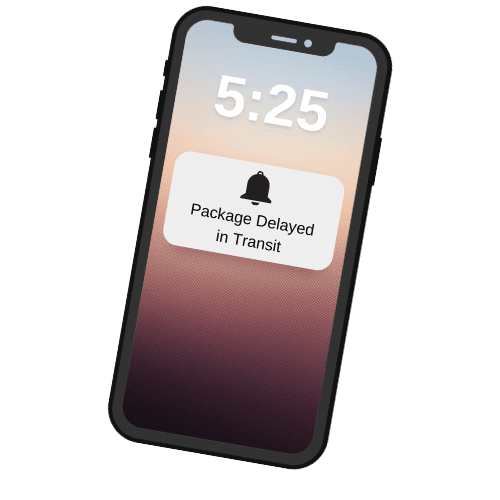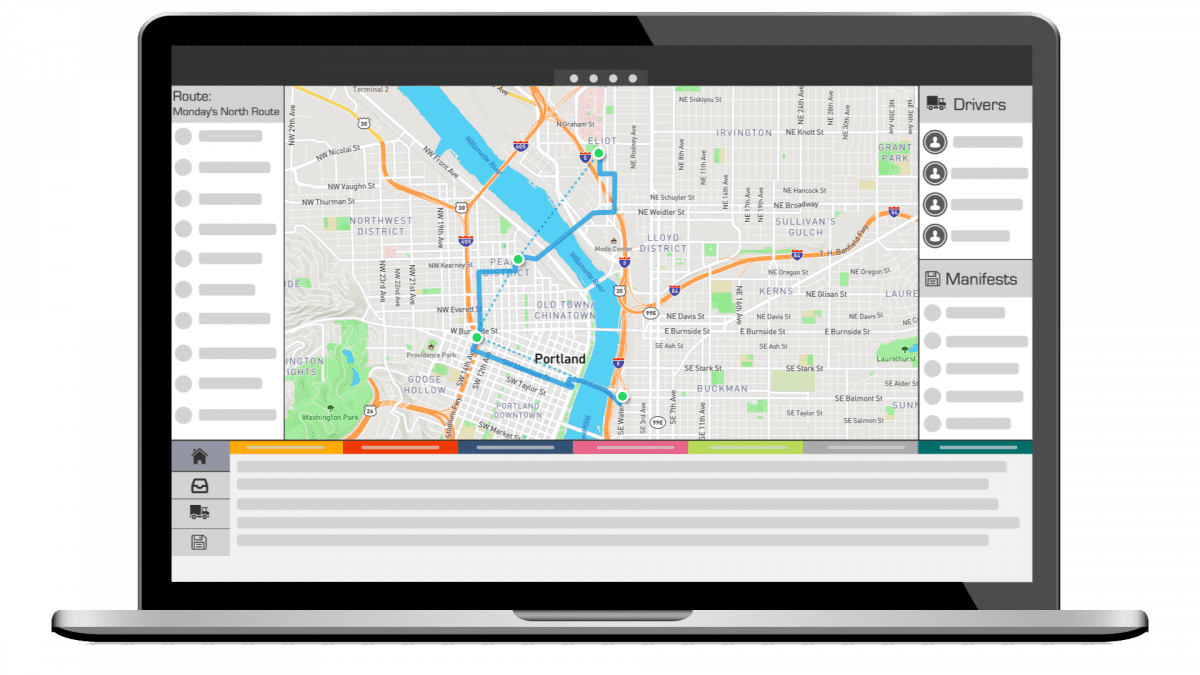
The world of eCommerce is highly competitive with businesses increasingly focused on gaining an edge over competitors in the last mile. This critical phase, from the distribution center to the customer’s door, can literally make or break customer satisfaction and loyalty. One key factor in last-mile success is scheduling deliveries effectively. By strategically planning and coordinating deliveries, businesses can boost operational efficiency, improve customer satisfaction, and stay ahead of the competition.
Delivery scheduling involves the meticulous organization of delivery routes and time slots to guarantee order fulfillment is on time and earlier if possible. By understanding and carefully considering variables like customer location, order quantity, and delivery preferences, businesses can tailor their delivery approach to meet individual customer demands. This level of personalization not only enhances the customer experience but also increases the likelihood of repeat purchases and positive word-of-mouth referrals.
With the advancements in technology available today, businesses can use the latest software and tools for strategic delivery scheduling. Fleet management software, for example, can maximize delivery routes, reduce fuel usage, and boost overall logistics management. Real-time data and tracking analytics offer valuable insights to pinpoint areas for improvement and adjustments to make operations faster and simpler. With the right technology solutions, you can improve accuracy, cost-effectiveness, and efficiency in those vital last-mile delivery operations.
The right delivery partner can be the secret to great success. The right delivery partner should be affordable, dependable, and provide excellent service quality to you and your customers. A strong collaboration with the right, reliable delivery service provider can dramatically impact the success of your last-mile deliveries.

Why Should You Schedule Your Deliveries?
Efficient delivery scheduling is a vital part of the success of your business’s last-mile operations. By strategically planning and organizing your deliveries, you can access a vast array of benefits that contribute to the overall growth of your business and to customer relationships. For example:
- Scheduling your deliveries allows you to boost speed and efficiency. By carefully planning routes and time slots, you can minimize travel time and reduce the chances of delays. With streamlined routes, your drivers can reach their destinations faster, leading to faster order fulfillment and improved delivery turnaround times. This not only boosts your operational efficiency but also allows you to provide fast and reliable service to your customers.
- The boost in productivity is another significant advantage of delivery schedules. Deliveries are organized and coordinated well in advance making your operation more efficient and better using your resources. Planning ahead allows you to assign tasks to your drivers based on their availability and proximity to delivery locations. Your resources are used better, idle time is decreased, and you’ll be able to increase the number of deliveries you can complete within a given timeframe.
- Saving money is another compelling reason to make scheduling deliveries a priority. By optimizing routes and minimizing travel distances, you significantly reduce fuel usage and reduce the wear and tear on your vehicles. By scheduling deliveries, you avoid unnecessary backtracking or overlapping routes which saves time and money. By saving on fuel expenses and making better use of your resources, you can also improve your bottom line and direct money saved to other crucial areas of your business.
- By scheduling deliveries, you’ll minimize delivery delays. Scheduling deliveries allows you to proactively identify potential bottlenecks or conflicts in your logistics network. By addressing these issues in advance, you can minimize delivery delays and disruptions, ensuring that your customers receive their orders on time.
- You’ll gain a competitive advantage. Efficient delivery scheduling can give your business a competitive edge in the marketplace. By consistently meeting delivery commitments, providing accurate ETAs, and offering reliable service, you differentiate your company from its competitors and build a reputation for excellence in customer service.
- Scheduling deliveries allows for more delivery options, giving businesses the flexibility to offer customers a range of choices. This includes time-specific delivery slots, same-day or next-day delivery, weekend and after-hours delivery, multiple delivery locations, and alternative delivery methods. By incorporating these options into your scheduling system, you refine the customer experience, cater to individual preferences, and provide great convenience.
- The best benefit you’ll get from scheduling deliveries is enhanced customer satisfaction. Accurate and reliable deliveries, lead to happy customers. When customers know when to expect their orders because your company is providing deliveries that meet or even exceed their expectations, you build trust and loyalty. A well-executed delivery schedule shows your commitment to customer convenience and once again sets you apart from competitors who may struggle with unreliable or unpredictable deliveries.
Want more industry insights?
Subscribe to our newsletter to receive weekly last mile logistics insights directly to your email inbox each week!
Tips for Scheduling Deliveries
As you can see, effective delivery scheduling can greatly benefit your business while ensuring smooth and timely order fulfillment. To help you simplify your delivery processes and boost customer satisfaction, here are some valuable tips for scheduling deliveries:
- Utilize Route Planning Software: Invest in route planning software or delivery management systems that can automate the process of optimizing routes based on factors like distance, traffic conditions, and delivery time windows. These tools can help you create efficient routes and allocate deliveries to drivers in a way that reduces travel time and maximizes productivity.
- Consider Delivery Time Windows: Take into account the specific time windows requested by your customers when scheduling deliveries. By aligning your delivery schedule with their preferences, you can ensure that orders are received at the most convenient times for recipients to provide a better customer experience.
- Prioritize Real-Time Tracking: Incorporate real-time tracking technology into your delivery operations. This allows you to monitor the progress of each delivery, anticipate any potential delays or issues, and proactively communicate with customers. Real-time tracking provides visibility and transparency which are vital for building trust and maintaining open lines of communication with your customers.
- Optimize Load Balancing: Efficiently distribute deliveries among your drivers to achieve load balancing. Consider factors like driver capacity, vehicle types, and delivery locations to ensure that each driver’s workload is manageable and that deliveries are evenly distributed. This greatly reduces the risk of delays or mistakes due to excessive workloads.
- Analyze Historical Data: Use data from past delivery operations to pinpoint patterns and optimize future scheduling. Analyzing historical data can offer insights into peak delivery times, recurring delivery challenges, and reveal other factors that can help you fine-tune your scheduling strategy. By learning from past experiences, you can make data-driven decisions while continuously improving your delivery processes.
- Communicate and Manage Expectations: Effective communication is key to scheduling deliveries effectively. Clearly communicate delivery timeframes to your customers, giving accurate estimates and updates whenever necessary. Be proactive in managing expectations by informing customers of any delays or changes in the delivery schedule. By keeping customers in the loop, you can maintain transparency and build trust.

- Account for Seasonal Fluctuations and Peak Periods: Analyze historical data to identify seasonal trends and peak periods of demand. Anticipate these fluctuations in your scheduling to allocate resources effectively and ensure timely deliveries during high-volume periods.
- Continuously Monitor and Analyze Performance: Regularly track key performance indicators (KPIs) related to delivery scheduling like on-time delivery rates, route efficiency, and customer satisfaction. Analyze the data to identify areas for improvement and fine-tune your scheduling processes accordingly.
Implementing these tips will help you optimize your delivery scheduling and achieve higher levels of operational efficiency. By using advanced technology solutions, analyzing data, and prioritizing effective communication, you can enhance customer satisfaction, reduce costs, and gain a competitive edge in the last mile.
Dynamic Scheduling: Adapting to Real-Time Changes
Commerce today moves at lightning speed and businesses must embrace dynamic scheduling to stay agile and responsive to evolving circumstances. Traditional static scheduling approaches no longer get the job done in an environment where unforeseen events, such as traffic congestion, weather conditions, or sudden order changes, can significantly impact delivery operations. To address these challenges, companies are turning to dynamic scheduling solutions that allow them to adapt in real time and take their delivery processes to the next level.
Dynamic scheduling involves the integration of real-time data and predictive analytics to make informed decisions on the go. By using advanced technologies, businesses can access up-to-the-minute data on factors like traffic conditions, driver availability, and order priorities. This real-time data integration allows for more accurate scheduling adjustments and better use of resources and manpower.
Predictive analytics drive dynamic scheduling by analyzing historical data, patterns, and external factors to forecast potential disruptions or changes in the delivery landscape. Using these predictive models, businesses can anticipate and proactively address potential problems before they occur. For example, predictive analytics can help identify the optimal delivery routes based on traffic patterns or recommend adjustments to delivery schedules to accommodate changes in customer demand.
Implementing dynamic scheduling requires the use of sophisticated software solutions that can handle real-time data integration, predictive analytics, and automated decision-making. These technologies empower businesses to make agile adjustments to their delivery schedules, use resources effectively, and maximize routes in response to changing conditions. The result is improved operational agility, reduced costs, and happier customers.
By embracing dynamic scheduling and leveraging real-time data integration and predictive analytics, businesses can navigate the complexities of the modern delivery landscape with greater confidence and efficiency. The ability to adapt to real-time changes ensures that businesses can meet customer expectations, handle unexpected events effectively, and stay ahead of the competition.
Leveraging Technology for Strategic Delivery Scheduling
Strategic delivery scheduling is key to gaining a competitive edge and meeting customer expectations. Fortunately, advancements in technology have revolutionized the way companies manage their shipping deliveries, empowering them to maximize schedules, boost operational efficiency, and improve the overall customer experience.
Delivery management software is at the forefront of this technological revolution. These innovative solutions provide companies with the tools and information they need to overhaul and improve their delivery operations and make strategic scheduling decisions. With delivery management software, businesses can automate and centralize key processes like order management, route planning, and real-time tracking.

One of the key features of delivery management software is its ability to optimize routes. By analyzing various factors like traffic conditions, delivery priorities, and driver availability, the software generates the most efficient routes for each delivery. This not only saves time and fuel costs but also guarantees that shipments are delivered in a timely manner.
Real-time tracking is another valuable capability offered by delivery management software. With GPS-enabled tracking, businesses can monitor the status and location of each shipment in real time. This visibility allows for proactive communication with customers, providing accurate delivery estimates and updates. Real-time tracking also enables businesses to respond swiftly to any unforeseen events or delays, ensuring transparency and maintaining customer satisfaction.
Taking advantage of technology for strategic delivery scheduling can help your company gain a significant competitive edge in the last-mile industry. Automation and optimization provided by delivery management software enable businesses to simplify their operations, cut costs, and improve productivity. Plus, the improved visibility and communication capabilities provide a seamless customer experience, leading to increased loyalty and a positive brand reputation.
At Elite EXTRA, we understand the importance of using technology for strategically scheduling deliveries. Our cutting-edge delivery management software offers comprehensive features and capabilities tailored to meet the unique needs of businesses in the last-mile industry. With our software, you can optimize routes, track shipments in real time, and deliver exceptional customer service. Join the ranks of industry leaders who have harnessed the power of technology to transform their delivery operations and achieve new levels of success.
Conclusion
The integration of advanced technology in strategic delivery scheduling has become a game-changer for businesses operating in the last-mile industry. Delivery management software empowers companies to automate and streamline their operations, optimize routes, and provide real-time tracking for shipments. By leveraging these advanced capabilities, businesses can gain a significant competitive edge, reduce costs, improve productivity, and enhance overall customer satisfaction.
At Elite EXTRA, we recognize the transformative impact of technology in the last-mile industry. Our delivery management software offers comprehensive features and capabilities designed to meet the unique needs of businesses in this fast-paced landscape. With our solutions, you can unlock the full potential of strategic delivery scheduling and propel your business to new heights of success. Contact us for a demo today and we’ll show you how our last-mile software can help you schedule your deliveries with ease.
Sources
https://www.supplychainconnect.com/
https://www.mckinsey.com/industries/travel-logistics-and-infrastructure/our-insights/technology-delivered-implications-for-cost-customers-and-competition-in-the-last-mile-ecosystem
https://www.ncbi.nlm.nih.gov/
https://dataspace.princeton.edu/







